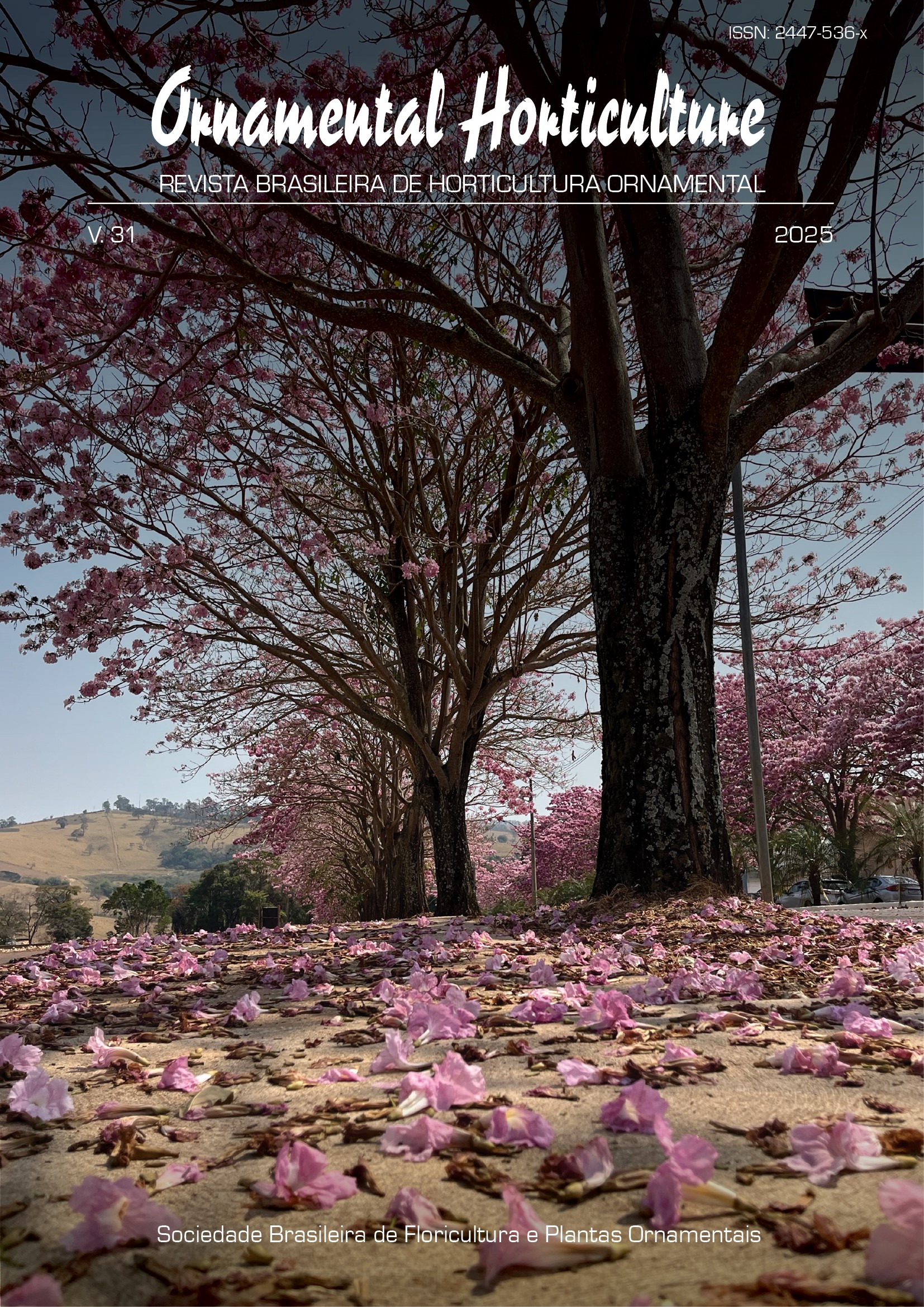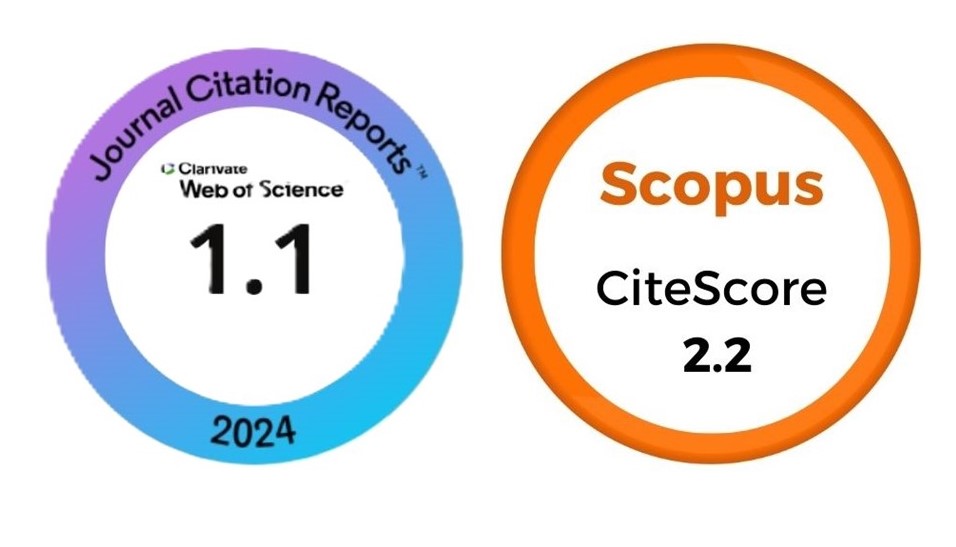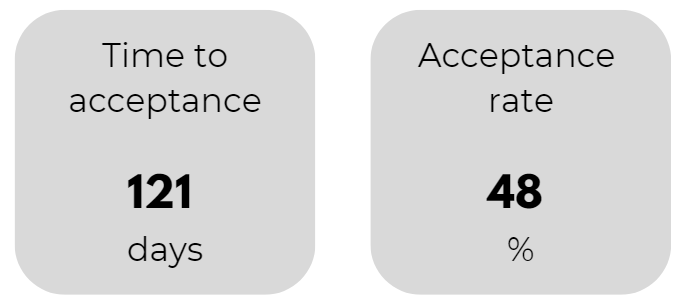Modelo de aprendizagem social de produtores de plantas ornamentais no uso de mídias sociais para marketing
DOI:
https://doi.org/10.1590/2447-536X.v31.e312846Palavras-chave:
Teoria de Bandura, exclusão digital, marketing digital, TIC para agricultores, autoeficáciaResumo
Os produtores de plantas ornamentais ganharam benefícios e experiência substanciais em vendas on-line, expandindo seus negócios até mesmo para mercados de exportação, desde a pandemia da COVID-19. No entanto, nem todos os produtores possuem a mesma capacidade de acompanhar as tendências da tecnologia da informação. Este estudo desenvolveu um modelo de aprendizagem social com o objetivo de abordar os desafios de alfabetização digital enfrentados pelos produtores de plantas ornamentais na região de Bogor. Uma amostra de 210 produtores de plantas ornamentais foi selecionada por amostragem aleatória simples. Os dados foram coletados por meio de questionários e analisados usando PLS-SEM 3.0 para examinar o impacto de fatores ambientais nos comportamentos dos produtores no uso de mídias sociais para marketing digital. O modelo de aprendizagem social incluiu canais diretos, canais mediados socialmente e autoeficácia. As descobertas revelaram que a integração de mídias sociais em sistemas sociais aumentou significativamente a autoeficácia e influenciou diretamente o engajamento dos produtores no uso de tais plataformas de comércio eletrônico. O estudo concluiu que utilizar mídias sociais dentro de estruturas comunitárias, especialmente por meio de uma abordagem orientada para o grupo, prova ser mais eficaz do que esforços individuais para motivar produtores de plantas ornamentais a adotar o marketing digital por meio de plataformas de mídia social.
Downloads
Referências
ADLA, S.; ARAVINDAKSHAN, A.; TYAGI, A.; GUNTHA, R.; PACHECO, MA.; NAGI, A.; PASTORE, P.; PANDE, S. Participatory development of mobile agricultural advisory driven by behavioural determinants of adoption. Journal of Environmental Management, v.374, n.3, p.124140, 2025. https://doi.org/10.1016/J.JENVMAN.2025.124140
AMINOTO, T.; PUJANINGSIH, F.B.; DANI, R.; RIANTONI, C. Assessing pre-service physics teachers’ competencies in designing photo-electric effect experiment using PhET simulation. Journal of Physics: Conference Series, v.1876, n.0120, p.1-10, 2021. http://doi.org/10.1088/1742-6596/1876/1/012065
ATAEI, P.; SADIGHI, H.; CHIZARI, M.; ABBASI, E. Analysis of farmers’ social interactions to apply principles of conservation agriculture in Iran: application of social network analysis. Journal of Agricultural Science and Technology, v.1 , n.7, p.1657–1671, 2020. https://jast.modares.ac.ir/article-23-21426-en.pdf
BANDURA, A. Entertainment-education and social change: history, research, and practice. social cognitive theory for personal and social change by enabling media. London: Lawrence Erlbaum. (LEA’s communication series), 2004.
BANDURA, A. Self-Efficacy In Changing Societies. Cambridge University Press. 1995. DOI: https://doi.org/10.1017/CBO9780511527692
CARRER, M.J.; DE SOUZA FILHO, H.M.; VINHOLIS, M.D.M.B.; MOZAMBANI, C.I. Precision Agriculture adoption and technical efficiency: an analysis of sugarcane farms in Brazil. Technological Forecasting and Social Change, v.177, 121510, 2022. https://doi.org/10.1016/j.techfore.2022.121510
CHORUMA D.J.; DIRWAI T.L.; MUTENJE M.J.; MUSTAFA M.; CHIMONYO V.G.P.; JACOBS-MATA I.; MABHAUDHI T. Digitalization in agriculture: A scoping review of technologies in practice, challenges, and opportunities for smallholder farmers in sub-Saharan Africa. Journal of Agriculture and Food Research, v.18, e.101286, 2024. https://doi.org/10.1016/j.jafr.2024.101286
DOANH, N.K.; QUYNH, N.N.; PHAM, T.T.L. Going organic or staying traditionalistic? The role of agriculture information system. International Journal of Social Economics, v.49, n.10, p.1458-1478, 2022. https://doi.org/10.1108/ijse-11-2021-0720
DOOLEY E. An Ethnographic look into farmer discussion groups through the lens of social learning theory. Sustainability, v.12, e7808, 2020. https://doi.org/10.3390/su12187808
FARINA, K.; KASHIF, A.; WU, Q.; OKSANA, G. Moderating role of digital media on environmental awareness and environmental beliefs to shape farmers’ behavioral intentions towards sustainable agricultural land conservation practices. Journal of Environmental Management, v.373, p.123745, 2025. http://doi.10.1016/j.jenvman.2024.123745
FEROZ, H.M.B.; ZULFIQAR, S.; NOOR, S.; HUO, C. Examining multiple engagements and their impact on students’ knowledge acquisition: the moderating role of information overload. Journal of Applied Research in Higher Education, v.14, n.1, p.366-393, 2021. https://doi.org/10.1108/JARHE-11-2020-0422
FIGEAC, J.; FAVRE, G. How behavioral homophily on social media influences the perception of tie-strengthening within young adults’ personal networks. New Media and society, v.25, n. 8, p.1971-1990, 2023. http://doi.org/10.1177/14614448211020691
GAO, L.; ARBUCKLE, J.R. Examining farmers’ adoption of nutrient management best management practices: a social cognitive framework. Agriculture and Human Values, v.39, p.535-553, 2022. https://doi.org/10.1007/s10460-021-10266-2
GHOZALI I.; LATAN H. Partial Least Squares. Concepts, techniques and applications using the Smart PLS 3.0 program for empirical research. Surabaya: Diponegoro University Publishing Agency, 2014.
GYAWALI, K. Role of social media in commercial vegetable farming for rural development. Saptagandaki Journal, 13(1), 101–115. 2022. DOI: https://doi.org/10.3126/sj.v13i1.54949
HAMANN R, NILSSON W, DRIMIE S. Testing chatgpt’s capabilities for social media content analysis. Aesthetic plastic surgery journal, v.48, n.13, p.2602-2604, 2024. https://doi.org/10.1007/s00266-023-03607-5
HARDIN, A.; DAVISON, R.M.; SCHNEIDER, C.; LOONEY, C.A.; SARKER, S. Contextualising collective efficacy in virtual team research: the essential role of collaborative technologies in the virtual team efficacy conceptual framework. Information Systems Journal, v.34, n.2, p.469- 498, 2024. https://doi.org/10.1111/isj.12484
HAIR JR. J.F., MARKO SARSTEDT, LUCAS HOPKINS, VOLKER G. KUPPELWIESER. Partial Least Squares Structural Equation Modeling (Pls-Sem): An Emerging Tool In Business Research. European Business Review. v.26(2). p.106-121. 2014. DOI: HTTPS://DOI.ORG/10.1108/EBR-10-2013-0128
HENDRICKS, S.; MWAPWELE, S.D. A systematic literature review on the factors influencing e-commerce adoption in developing countries. Data Information Management, v.8, n.1, p.1-14, 2023. https://doi.org/10.1016/j.dim.2023.100045
HUANG, J.; SU, L.; LIU, X. Facilitating inclusive Use of ICTs in rural China. In: Agricultural Development in Asia and Africa: Essays in Honor of Keijiro Otsuka. Singapore: Springer Nature Singapore, 2023. p.197-211.
KOTLER, P.; KELLER, K.L. A Framework For Marketing Management. Sixth edition. London: Pearson Education Limited, 2016. 360p.
LIU, Y.; HU, K. How social media exposure constructs social confidence: An empirical study on impact, mechanisms, and multilateral relationships. Plos One, v.19, p.9, 2024. https://doi.org/10.1371/journal.pone.0308745
LORENTA, H. The competitive and comparative advantages of aglaonema farming in Depok City, Indonesia. Ornamental Horticulture, v.30, e.242657, p.1-7. 2024. https://doi.org/10.1590/2447-536X.v30.e242657
MANIKAS, I.; MALINDRETOS, G.; ABELIOTIS, K. Sustainable cities through alternative urban farming: The case of 365 floriculture. Journal of International Food and Agribusiness Marketing, v.32, n.1, p.1-17, 2019. https://doi.org/10.1080/08974438.2019.1599762
McKIM, A.J.; VELEZ, J.J. An evaluation of the Self-Efficacy Theory in Agricultural Education. Journal of Agricultural Education. v.57, 73–90. 2016. https://doi.org/10.5032/jae.2016.01073
MENDES, J.J.; CARRER M.J.; VINHOLIS, BRANDAO VINHOLIS, M.M.; FILHO, H.M. Adoption and impacts of messaging applications and participation in agricultural information-sharing groups: an empirical analysis with brazilian farmer. Journal of Agribusiness in Developing and Emerging Economies, v.14, n.4, p.18, 2023. https://doi.org/10.1108/JADEE-09-2022-0194
MUBAROK, S.; SUMINAR, E.; KARYANI, T.; RUFAIDAH, F.; NOVANDA, S.; NUR RAHMAT, B.P. An overview of the increasing ornamental plant business in Indonesia post-COVID-19 as a result of social media and its future perspective. Sustainability, v.15, n.19, p.14211, 2023. https://10.3390/su151914211
NURFATHIYAH, P.; RENDRA. Effectiveness of media and extension materials in the implementation of the legowo row planting system in Sakernan district, Muaro Jambi Regency. Jurnal Ilmiah Ilmu Terapan Universitas Jambi, v.4, n.1, p.93-110, 2020. https://doi.org/10.22437/jiituj.v4i1.9850
NURLAELA S.; HARIADI S.S.; RAYA A.B. Self-efficacy and entrepreneurial behavior of horticultural young farmers in the special region of Yogyakarta Indonesia. International Journal of Psychosocial Rehabilitation, v.24, n.6, p.14029-14035, 2020. https://www.researchgate.net/publication/342439362
ORTIZ, C.; PETERSON, D.; COLLART A.; DOWNEY, L.; SEAL, S.; GALLARDO, R. Small farmers’ use of social media and other channels for marketing their agricultural products. Journal of Extension, v.49, n.4, 19, 2021. http://doi.org/10.34068/joe.59.04.19
SANBORN, F. A cognitive psychology of mass communication. Abingdon: Routledge. 2022. 568p.
Śledzik, K. Schumpeter’s View on Innovation and Entrepreneurship. SSRN Electronic Journal. 2013. DOI: http://doi.org/10.2139/ssrn.2257783.
SCHOLZ, M. Social learning and transition perspective on a climate change project in South Africa. Environmental Innovation and Societal Transitions, v.34, p.322-335, 2020. https://doi.org/10.1016/j.eist.2019.10.011
SEREENONCHAI, S.; ARUNRAT, N. Communication strategies for sustainable urban agriculture in Thailand. Sustainability, v.16, n.24, 10898, 2024. https://doi.org/10.3390/su162410898
UY, T. C., LIMNIRANKUL, B., KRAMOL, P., SEN, L. T. H., HUNG, H. G., KANJINA, S., & SIRISUNYALUCK, R. Social Media adoption for agricultural development: Insights from smallholders in central Vietnam. Information Development. 2024 https://doi.org/10.1177/02666669241261355
WANG, F.; WANG, M.; WAN, Y.; JIN, J.; PAN, Y. The power of social learning: how do observational and word-of-mouth learning influence online consumer decision processes?. Information Processing and Management, v.58, n.5, 102632, 2021. https://doi.org/10.1016/j.ipm.2021.102632
ZHANG, Y.; ZHANG, Y. The influence of digital literacy on the phenomenon of deviation between farmers’ e-commerce sales willingness and behavior: evidence from rural China. Sustainability, v.16, n.7, 3000, 2024. https://10.3390/su16073000
ZONDO, W.N.S.; NDORO, J.T. Attributes of diffusion of innovation’s influence on smallholder farmers’ social media adoption in Mpumalanga province, South Africa. Sustainability, v.15 n.5, p.4017, 2023. https://doi.org/10.3390/su15054017
Downloads
Publicado
Edição
Seção
Licença
Copyright (c) 2025 Ornamental Horticulture

Este trabalho está licenciado sob uma licença Creative Commons Attribution 4.0 International License.








